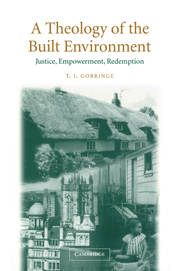Book contents
- Frontmatter
- Contents
- Preface
- 1 The theology of the built environment
- 2 Constructed space and the presence of God
- 3 The land
- 4 The human dwelling
- 5 From Eden to Jerusalem: town and country in the economy of redemption
- 6 The meaning of the city
- 7 Constructing community
- 8 But is it art?
- 9 God, nature and the built environment
- 10 Towards Jerusalem?
- Select bibliography
- Index of names
- Index of subjects
9 - God, nature and the built environment
Published online by Cambridge University Press: 22 September 2009
- Frontmatter
- Contents
- Preface
- 1 The theology of the built environment
- 2 Constructed space and the presence of God
- 3 The land
- 4 The human dwelling
- 5 From Eden to Jerusalem: town and country in the economy of redemption
- 6 The meaning of the city
- 7 Constructing community
- 8 But is it art?
- 9 God, nature and the built environment
- 10 Towards Jerusalem?
- Select bibliography
- Index of names
- Index of subjects
Summary
The earth lies polluted under its inhabitants;
for they have transgressed laws, violated the statutes,
broken the everlasting covenant.
Therefore a curse devours the earth …
(Isaiah 24.5–6)A theology of the built environment, I argued in the first chapter, must be a theology of liberation. There is a familiar and ancient division between theologies centred more on creation and those centred more on salvation. Liberation theology belongs more to the latter, we are told: Exodus not Genesis is its paradigm text. This, however, cannot be the case in the present world situation. Writing in 1980 E. P. Thompson characterised the Western mind set as ‘exterminism’, referring not to nuclear weapons but to the threat posed by the sheer material success of our culture, and arguing that the material volume of the modern economy is incompatible with ecological stability. If that is the case, then the environmental movement, which is fundamentally a challenge to the internal logic of capitalism, must be the first, second and third imperative of a global liberation theology.
THE BUILT ENVIRONMENT AND THE ENVIRONMENTAL CRISIS
There is by now a very substantial literature on the environmental crisis, and I shall not repeat all the arguments and evidence here. The crisis rests on the conjunction of a burgeoning world population (which has grown from 1.6 billion to more than 6 billion since 1900, and nearly doubled since 1961) and the fact that per capita energy and material consumption have soared faster in the past forty years than human population. The result is that ‘[a]n irresistible economy seems to be on a collision course with an immoveable ecosphere’.
- Type
- Chapter
- Information
- A Theology of the Built EnvironmentJustice, Empowerment, Redemption, pp. 222 - 240Publisher: Cambridge University PressPrint publication year: 2002



